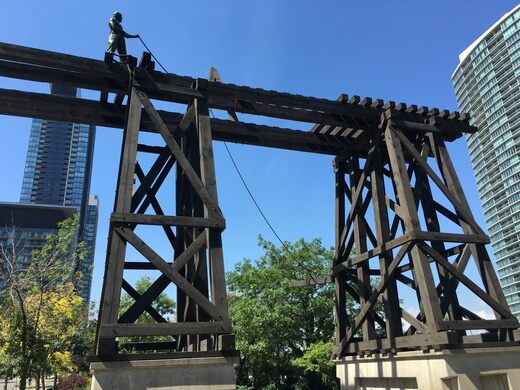After seeing the Mush Hole, we ate lunch in Berczy Park and students enjoyed interacting with the public art, like the trompe l'oeil building, the dog fountain, and the hands:

 |
| Class photo by L.B.W. Thank you! |
 |
| We also enjoyed the Hockey Hall of Fame public sculpture |
We focused on 3 main sites as we walked west along Front:
1. WSIB Sculptures in Simcoe Park. There are two parts to this sculpture, a bronze cast of a worker carving the inscription "Remembering our Past, Building a Safe Future" by Lana Winkler and Derek Lo.
 |
| Photo fromWikipedia |
Then a long shelf called 100 Workers (by John Scott and Stewart H. Pollock), covered with plaques memorializing workplace deaths of Canadians (1 per year in the 20th century). Some students were really interested in reading all the captions and names. We talked a bit about how laws and regulations were key to making people safer.
 |
| photo from Reddit |

 |
| Photo taken from Atlas Obscura |
Here's a link to an Atlas Obscura Article about this history and this site: https://www.atlasobscura.com/places/chinese-railroad-workers-memorial
3. Finally, we stopped at The Thimble and Buttons at Richmond and Queen before getting on the streetcar back towards school. This piece, actually called Uniform Measure/Stack by Stephen Cruise, is missing the measuring tape that used to be part of it, but still commemorates the area's history as the Garment District.
I just learned that the measuring tape was a guerilla element, so I'll link to spacing's review of that element: http://spacing.ca/toronto/2006/12/11/thimble-art-starts-to-measure-up/ and a more recent news article talking about its removal: https://toronto.citynews.ca/2015/08/27/blog-street-art-tape-measure-removed-from-richmond-and-spadina/, just because I personally find this fascinating. (There's currently a lot of construction around here, so I originally assumed it had disappeared due to that.)
I used this last stop to as an excuse to talk about the Triangle Shirtwaist Factory Fire, which was one of the deadliest industrial disasters ever. Because doors to the stairwells and exits were locked to prevent workers from taking unauthorized breaks, 146 people died, many of them women and recent immigrants. The outrage from this tragedy did lead to more regulations and safety standards. Here's a link to the Wiki article: https://en.wikipedia.org/wiki/Triangle_Shirtwaist_Factory_fire
Spadina and Kensington Market is an area filled with the history of different groups that have emigrated to Toronto, from the Jewish community that dominated the areas in the 20's and 30's, the Hungarians in the 50's, the Chinese Canadian community and the Portuguese Canadian community starting in the 60's, all the way to the current influx of Latin American restaurants and food stores. I asked students to look for different languages as we went up the street and there were many different scripts to be found.
Of course, I barely skimmed the surface of this history in our little walk and I missed some bits that I'd loved to put in for a next time, but we enjoyed our walk and learned to always read the plaques.
Sincerely,
 |
| Photo from CityNews, 2015 |
I used this last stop to as an excuse to talk about the Triangle Shirtwaist Factory Fire, which was one of the deadliest industrial disasters ever. Because doors to the stairwells and exits were locked to prevent workers from taking unauthorized breaks, 146 people died, many of them women and recent immigrants. The outrage from this tragedy did lead to more regulations and safety standards. Here's a link to the Wiki article: https://en.wikipedia.org/wiki/Triangle_Shirtwaist_Factory_fire
 |
| Shirtwaist Factory Fire (photo from Wikipedia) |
Of course, I barely skimmed the surface of this history in our little walk and I missed some bits that I'd loved to put in for a next time, but we enjoyed our walk and learned to always read the plaques.
Sincerely,
Ms. Goegan
P.S. There are so many rabbit holes to fall into on this topic, I couldn't resist adding some more articles--especially the ones with historical photos to help show the history in some more detail.
https://torontoist.com/2017/06/protests-parades-walking-tour-labour-history-spadina/
About the Brotherhood of Sleeping Car Porters:
http://torontoplaques.com/Pages/Brotherhood_of_Sleeping_Car_Porters.html
https://www.thecanadianencyclopedia.ca/en/article/sleeping-car-porters-in-canada
About the Yiddish Playhouse at Dundas and Spadina:
https://torontoist.com/2015/07/historicist-torontos-yiddish-playhouse/
About Queen and Spadina:
http://spacing.ca/toronto/2015/06/23/tour-queen-spadina-hundred-years-ago/
Visual History of Spadina in Pictures:
https://www.blogto.com/city/2012/04/a_visual_history_of_spadina_avenue/
History of Toronto's Chinatown:
https://www.rcinet.ca/patrimoine-asiatique-en/2018/05/22/torontos-past-and-present-chinatown/
History of Kensington Market:
https://www.thecanadianencyclopedia.ca/en/article/kensington-market
https://www.blogto.com/city/2011/07/a_visual_history_of_kensington_market/
And, the history of the St. Lawrence Market:
https://www.thestar.com/news/gta/2015/12/17/once-upon-a-city-st-lawrence-market-at-centre-of-torontos-history-since-1831.html
P.S. There are so many rabbit holes to fall into on this topic, I couldn't resist adding some more articles--especially the ones with historical photos to help show the history in some more detail.
https://torontoist.com/2017/06/protests-parades-walking-tour-labour-history-spadina/
About the Brotherhood of Sleeping Car Porters:
 |
| We walked right past this plaque |
https://www.thecanadianencyclopedia.ca/en/article/sleeping-car-porters-in-canada
About the Yiddish Playhouse at Dundas and Spadina:
https://torontoist.com/2015/07/historicist-torontos-yiddish-playhouse/
About Queen and Spadina:
http://spacing.ca/toronto/2015/06/23/tour-queen-spadina-hundred-years-ago/
Visual History of Spadina in Pictures:
https://www.blogto.com/city/2012/04/a_visual_history_of_spadina_avenue/
History of Toronto's Chinatown:
https://www.rcinet.ca/patrimoine-asiatique-en/2018/05/22/torontos-past-and-present-chinatown/
History of Kensington Market:
https://www.thecanadianencyclopedia.ca/en/article/kensington-market
https://www.blogto.com/city/2011/07/a_visual_history_of_kensington_market/
And, the history of the St. Lawrence Market:
https://www.thestar.com/news/gta/2015/12/17/once-upon-a-city-st-lawrence-market-at-centre-of-torontos-history-since-1831.html